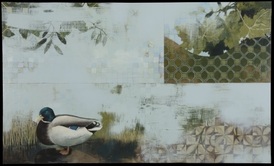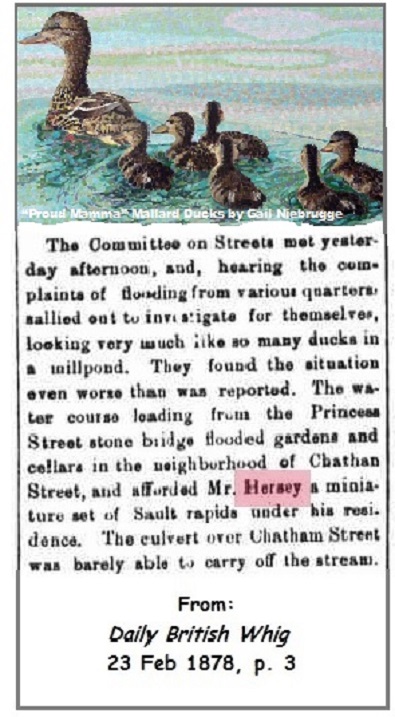selves, looking very much like so many ducks in a millpond. They found the situation even worse than was reported. The water course leading from the Princess Street stone bridge flooded gardens and cellars in the neighborhood of Chatham Street, and afforded Mr. Hersey a miniature set of Sault rapids under his residence. The culvert over Chatham Street was barely able to carry off the stream…"
From The Daily British Whig 23 Feb 1878, p. 3
Scroll below for full transcription of article.
From The Daily British Whig 23 Feb 1878, p. 3
Scroll below for full transcription of article.
It was not a catastrophic event on the scale of average world disasters. But on February 22, 1878 the sky above southern Ontario, Canada deluged the earth and all creatures below with over two inches of rain within twelve hours (see the Government of Canada Daily Data Report for February, 1878.) The land was not prepared for this comparatively small amount of precipitation. City infrastructure and the suddenness of the downpour overpowered drains and streets in towns all over the southern province. Thomas Albert's Chatham Street property in the Rideau Ward of Kingston, which contained two structures and housed his large family and his parents, was on low elevation. Contrary to the somewhat jocular tone of this article from the Kingston Whig, the flood must have had an immensely negative effect on the Herseys. The subsequent months held tragedy for the family; David John Hersey's father-in-law died of illness the following month, the youngest of Thomas Albert Hersey's children, an infant at the time of the flood, disappears from all records, and the health of patriarch Daniel Hersey gradually declined leading to his dementia and death in the following year. These events must have contributed to the family's decision to leave the area.
Ducks in the millpond, Geese in the ocean;
Hug them girls, If I take a notion.
Ducks in the millpond, Geese in the clover,
Jumped in the bed, And the bed turned over.
Ducks in the millpond, Geese in the clover,
Fell in the millpond, Wet all over.
Rain come wet me, sun come dry me,
Step back girl, don't you come nigh me.
Hug them girls, If I take a notion.
Ducks in the millpond, Geese in the clover,
Jumped in the bed, And the bed turned over.
Ducks in the millpond, Geese in the clover,
Fell in the millpond, Wet all over.
Rain come wet me, sun come dry me,
Step back girl, don't you come nigh me.
Transcription:
The Drains and the Floods.
The rain fall of Thursday night and Friday was heavy, but not alarming, till the water began to near the natural water courses about the city, and flood a good many places. The steady showers found their way almost directly to the low places, as there was neither snow nor soft earth to absorb the water, and the result was a freshet all around. The cellars of about one fourth of the citizens were flooded, even the big drain on Princess Street, a $12,000 work, not being able to keep the houses on the thoroughfare from damage. Mrs. Stratford's cellar was reported to be in a bad state, But it was on the line of the proposed new city drains that the greatest trouble arose, and the occurrences have given weight to the Counsel's immediate action - though by the withdrawal of the tender of the Messrs. McCarney, on the one hand, and the stoppage of Mr. Cunningham's work on the other, their first practical attempt had been abortive.
The Committee on Streets met yesterday afternoon, and, hearing the complaints of flooding from various quarters sallies out to investigate for themselves, looking very much like so many ducks in a millpond. They found the situation even worse than was reported. The water course leading from the Princess Street stone bridge flooded gardens and cellars in the neighborhood of Chatham Street, and afforded Mr. Hersey a miniature set of Sault rapids under his residence. The culvert over Chatham Street was barely able to carry off the stream. On the corner of Division and Upper York Streets there was another extensive flood, the yard and garden of one resident, Capt. Murray, being a beautiful lake, upon the surface of which appeared, as the only ark of safety, a square pump box. Mr. Hodge's place was also badly swamped. The main floors of some of the houses were swamped, and furniture and carpets had to be removed. The serious stoppage of the watercourse was at Mr. Brannigan's on Montreal Street, where there was an acre of water, back and front, filling his cellar and destroying a quantity of stuff stored in it. Mr. Quigley's shop and house adjoining, being on a level with the "watery waste" in the street, was uninhabitable, the water being over o foot deep on the main floor. The culvert across the street was too small to do the work required. The same stream overflowed Rideau Street, where both culvert and drain are far too small.
There is another branch stream from Chatham Street which finds its way through Rideau and Frontenac Wards, to an outlet near Mr. Gormley's place on the Montreal Road. The flow was a heavy one, but did no damage till it had crossed Montreal Street, where the low land inside the K. & P. RR track were swamped, the railway culverts affording no sufficient outlet. The proposed drain, familiarly called Alderman Carson's, it is proposed to connect with this natural flow and if it should succeed in tapping both of the streams we have already described, a much larger outlet at the railroad track will be needed. In uniting two general watercourses, the Committee will have to provide against any increased overflows or damages.
On the south side of Princess Street there was considerable of a water splurge. The water course, which is such a trouble to Alderman Gaskin and Mr. Charles Field was at its height. The latter's residence, garden and green house were surrounded with the flood; the Orphans' Home garden, sheds and root house were well watered, and Mr. Cunningham's handsome new residence on Union Street was greatly damaged by the water filling the basement to a height of two feet. His horses were also driven from the stable by the rushing in of mighty waters. On Arch Street several residents complained of the flooding, especially Mr. Samuel Cunningham, who is yearly a victim of freshets. The drains tendered for by Messrs. McCartney and others, and ordered by the Council, were designed to relieve this flow, and the question new agitating the Committee's mind is the proper course to take, whether down Gordon Street over the hill to the lake or by way of David, Union and Arch Streets to Queen's College drain.
However, while the direction of these big $3,000 drains is being discussed, as well as the city's ability to bear the expense this year, we hope that immediate repairs will not be neglected, the cleaning of the drains at Field's, Brannigan's and other paces.
The Drains and the Floods.
The rain fall of Thursday night and Friday was heavy, but not alarming, till the water began to near the natural water courses about the city, and flood a good many places. The steady showers found their way almost directly to the low places, as there was neither snow nor soft earth to absorb the water, and the result was a freshet all around. The cellars of about one fourth of the citizens were flooded, even the big drain on Princess Street, a $12,000 work, not being able to keep the houses on the thoroughfare from damage. Mrs. Stratford's cellar was reported to be in a bad state, But it was on the line of the proposed new city drains that the greatest trouble arose, and the occurrences have given weight to the Counsel's immediate action - though by the withdrawal of the tender of the Messrs. McCarney, on the one hand, and the stoppage of Mr. Cunningham's work on the other, their first practical attempt had been abortive.
The Committee on Streets met yesterday afternoon, and, hearing the complaints of flooding from various quarters sallies out to investigate for themselves, looking very much like so many ducks in a millpond. They found the situation even worse than was reported. The water course leading from the Princess Street stone bridge flooded gardens and cellars in the neighborhood of Chatham Street, and afforded Mr. Hersey a miniature set of Sault rapids under his residence. The culvert over Chatham Street was barely able to carry off the stream. On the corner of Division and Upper York Streets there was another extensive flood, the yard and garden of one resident, Capt. Murray, being a beautiful lake, upon the surface of which appeared, as the only ark of safety, a square pump box. Mr. Hodge's place was also badly swamped. The main floors of some of the houses were swamped, and furniture and carpets had to be removed. The serious stoppage of the watercourse was at Mr. Brannigan's on Montreal Street, where there was an acre of water, back and front, filling his cellar and destroying a quantity of stuff stored in it. Mr. Quigley's shop and house adjoining, being on a level with the "watery waste" in the street, was uninhabitable, the water being over o foot deep on the main floor. The culvert across the street was too small to do the work required. The same stream overflowed Rideau Street, where both culvert and drain are far too small.
There is another branch stream from Chatham Street which finds its way through Rideau and Frontenac Wards, to an outlet near Mr. Gormley's place on the Montreal Road. The flow was a heavy one, but did no damage till it had crossed Montreal Street, where the low land inside the K. & P. RR track were swamped, the railway culverts affording no sufficient outlet. The proposed drain, familiarly called Alderman Carson's, it is proposed to connect with this natural flow and if it should succeed in tapping both of the streams we have already described, a much larger outlet at the railroad track will be needed. In uniting two general watercourses, the Committee will have to provide against any increased overflows or damages.
On the south side of Princess Street there was considerable of a water splurge. The water course, which is such a trouble to Alderman Gaskin and Mr. Charles Field was at its height. The latter's residence, garden and green house were surrounded with the flood; the Orphans' Home garden, sheds and root house were well watered, and Mr. Cunningham's handsome new residence on Union Street was greatly damaged by the water filling the basement to a height of two feet. His horses were also driven from the stable by the rushing in of mighty waters. On Arch Street several residents complained of the flooding, especially Mr. Samuel Cunningham, who is yearly a victim of freshets. The drains tendered for by Messrs. McCartney and others, and ordered by the Council, were designed to relieve this flow, and the question new agitating the Committee's mind is the proper course to take, whether down Gordon Street over the hill to the lake or by way of David, Union and Arch Streets to Queen's College drain.
However, while the direction of these big $3,000 drains is being discussed, as well as the city's ability to bear the expense this year, we hope that immediate repairs will not be neglected, the cleaning of the drains at Field's, Brannigan's and other paces.



 RSS Feed
RSS Feed